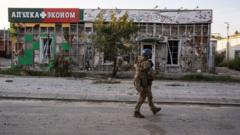President Trump's recent directive to freeze federal funding is causing widespread disruption across the U.S., as a federal judge intervenes and states file lawsuits against the mandate.
Trump's Federal Spending Freeze Sparks Controversy and Confusion

Trump's Federal Spending Freeze Sparks Controversy and Confusion
A drastic order puts millions at risk of losing vital services and ignites legal battles
The chaos ensued swiftly as President Trump's controversial directive to freeze trillions of dollars in federal grants and loans faced immediate legal backlash. This order, which aimed to reshape government initiatives through stringent ideological controls, was temporarily blocked by a federal judge. As a result, 22 states and the District of Columbia have united in a lawsuit arguing that Trump overstepped his constitutional authority, intensifying an atmosphere of uncertainty.
Even before the official start of the freeze, essential social services and programs found themselves disrupted, leaving millions grappling with the fear of losing their jobs, access to healthcare, and other necessary services. This abrupt shift follows another recent Trump decision involving significant cuts to international aid, pushing a broader agenda to dismantle programs deemed "woke."
The administration defends its actions as a necessary measure to ensure that federal funds do not support what it labels "Marxist equity," "transgenderism," or Green New Deal initiatives, suggesting a deeper ideological examination of spending programs. Critics, however, have described the freeze as a far-reaching blow to humanitarian efforts, particularly noting that organizations in Ukraine have suspended life-saving distributions of HIV medications funded by U.S. aid. Edward Wong, a diplomatic correspondent, remarked that such sweeping aid restrictions are unprecedented in their impact on global humanitarian operations.
The consequences of this financial freeze raise significant concerns, not only for those reliant on governmental support but also for the future efficacy and integrity of myriad assistance programs critical to societal stability.
Even before the official start of the freeze, essential social services and programs found themselves disrupted, leaving millions grappling with the fear of losing their jobs, access to healthcare, and other necessary services. This abrupt shift follows another recent Trump decision involving significant cuts to international aid, pushing a broader agenda to dismantle programs deemed "woke."
The administration defends its actions as a necessary measure to ensure that federal funds do not support what it labels "Marxist equity," "transgenderism," or Green New Deal initiatives, suggesting a deeper ideological examination of spending programs. Critics, however, have described the freeze as a far-reaching blow to humanitarian efforts, particularly noting that organizations in Ukraine have suspended life-saving distributions of HIV medications funded by U.S. aid. Edward Wong, a diplomatic correspondent, remarked that such sweeping aid restrictions are unprecedented in their impact on global humanitarian operations.
The consequences of this financial freeze raise significant concerns, not only for those reliant on governmental support but also for the future efficacy and integrity of myriad assistance programs critical to societal stability.





















